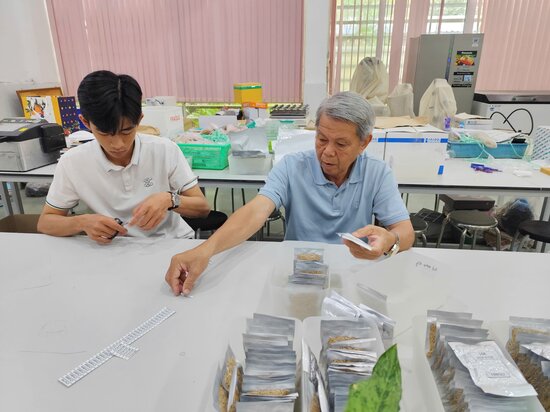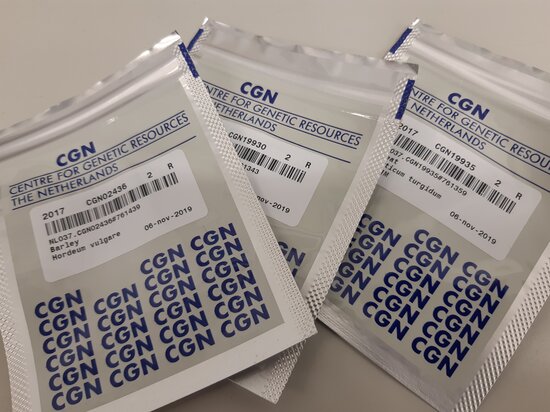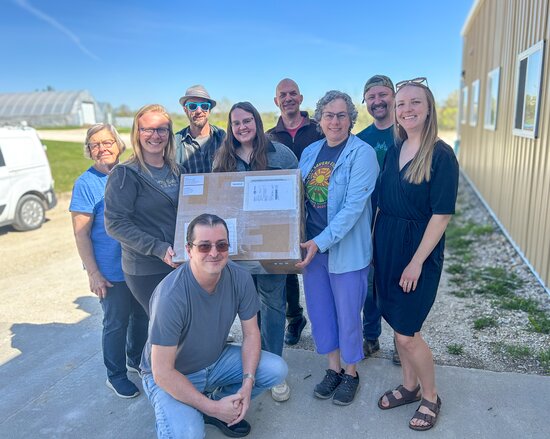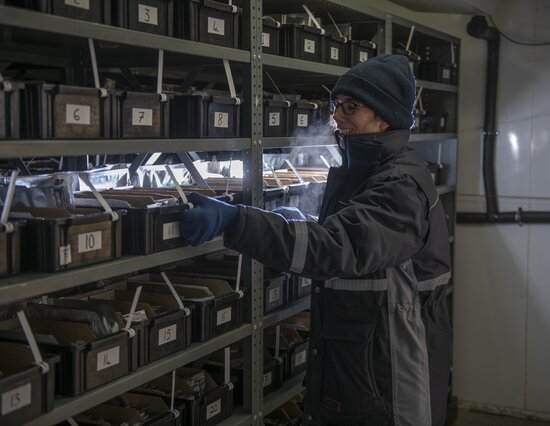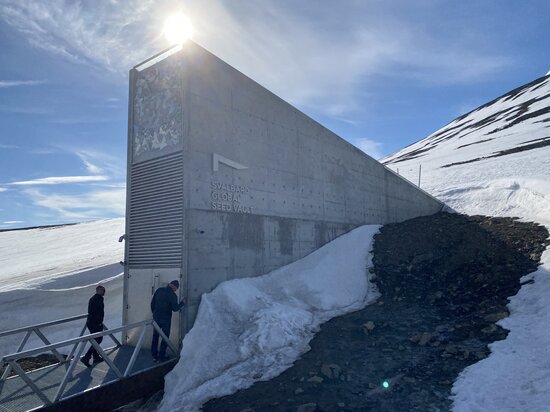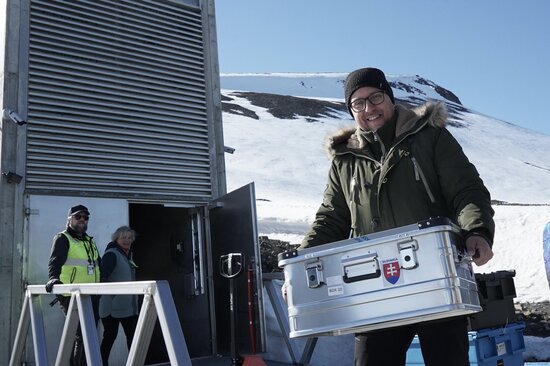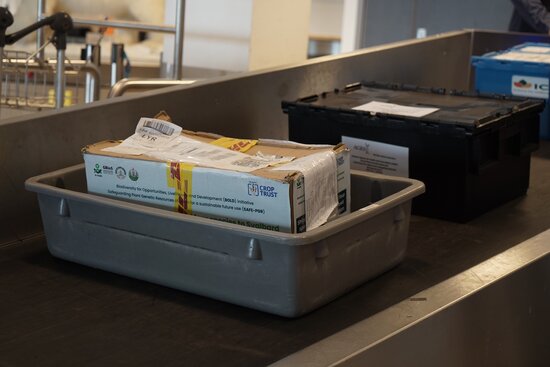Heritage and Health Take Center Stage at the Latest Svalbard Global Seed Vault Deposit

3 June 2025
As genebanks around the world deposit seed samples in the Svalbard Global Seed Vault this week, the focus is on how crop diversity reflects cultural heritage.
LONGYEARBYEN, NORWAY, 3 June 2025 – Fourteen genebanks will deposit 11,206 seed samples in the Svalbard Global Seed Vault this week, including vegetables and traditional crops that are as important to cultural identity as they are to nutrition and resilience to climate change.
The world’s largest repository of crop diversity will receive and store seed samples of cultural icons ranging from Korea’s perilla and adzuki bean to Dutch heritage cabbage and spinach varieties and Benin’s ancient cereal fonio and melon.
The 67th deposit adds to the more than 1.3 million accessions already in the Seed Vault. Located deep in the Arctic permafrost on the Norwegian island of Spitsbergen, the Seed Vault is managed by the Norwegian Government, NordGen and the Crop Trust.
Some genebanks are depositing copies of their seed collections with the support of the Biodiversity for Opportunities, Livelihoods and Development (BOLD) project, which is funded by Norway and managed by the Crop Trust. BOLD provides grants to help partners regenerate seeds from their collections and back them up in Svalbard.
A Debut, a Mainstay and a Major Contribution
A first-time depositor and BOLD project beneficiary, Can Tho University in Vietnam, deposits 1,000 rice samples selected to reflect the crop’s cultivation in the Mekong Delta. The accessions chosen include both improved varieties and traditional landraces.
The Seed Savers Exchange is the only genebank in the world to deposit seeds every year since the Seed Vault opened in 2008. This year, the U.S.-based nonprofit organization marks its 50th anniversary with a new deposit of 16 varieties of arugula, barley, common beans, collard, cowpea, cucumber, eggplant, flax, lettuce, millet, okra, poppy, rutabaga, sesame, sunflower and tomato. The Seed Savers Exchange focuses on heirloom and open-pollinated crops, preserving the genetic and cultural diversity of America’s food heritage.
“Backing up seeds brings peace of mind," says Briana Smorstad, Seed Bank Manager at Seed Savers Exchange. "Preserving biodiversity in our crops and gardens often feels like an uphill battle, but sending seeds to Svalbard is a reminder that we’re not in this alone. There’s a global community of people who are doing the same work because they care deeply about crop diversity.”
On this occasion, Korea’s Rural Development Administration is depositing the largest number of samples, with 4,000 accessions of key local crops. These include rice, soybean, adzuki bean, barley, sesame, sorghum, foxtail millet, perilla and radish. Seed samples were selected based on their cultural or economic importance, and representation of unique local diversity.
Eat the Rainbow, Save the Seeds
Other genebanks that received support from the BOLD Project include ones in Benin and the Philippines, which shipped copies of eggplant, tomato, pepper, and lima bean seeds. Meanwhile, the Kenya Agricultural & Livestock Research Organization’s Genetic Resources Research Institute delivered samples through Seeds for Resilience, a project that is funded by Germany’s Federal Ministry for Economic Cooperation and Development and led by the Crop Trust.
Prior to the opening, U.K. and Norwegian foreign ministers travelled to the Seed Vault. UK Foreign Secretary David Lammy personally delivered deposits of 286 vegetable seed samples from the Warwick Genetic Resources Unit in the U.K., including brassicas, carrots and lettuce.
“Crop genetic diversity is the raw material needed to create new crop varieties," says Warwick Genetic Resources Unit’s Head, Dr Charlotte Allender. "The development of new varieties is essential for a food-secure future as part of sustainable farming systems. I feel I have done my job when samples are backed up – ensuring their ongoing availability for farmers, breeders and researchers."
The Centre for Genetic Resources in the Netherlands deposited a vegetable-rich box that includes seeds of onion, cabbage, radish, lettuce, spinach, tomato, wild potato, pepper, carrot and asparagus.
The seeds safely backed up at the Svalbard Global Seed Vault represent the flavors, traditions and memories carried by our food. With proper investment in the world’s genebanks, we can ensure that no essential seeds, nor the stories they hold, are lost to time and chance.
QUOTES:
Crop Trust:
“This week’s deposits provide another snapshot of the rich crop diversity now held in the Seed Vault. These deposits acknowledge cultural heritage as key to the survival of plant varieties that are all too often forgotten but are surely vital to the future of food. The Crop Trust works through BOLD and other projects to ensure these culturally significant crops are conserved forever. The time to act is now,” says Dr Stefan Schmitz, Executive Director of the Crop Trust.
NordGen:
"Each genebank collection is unique, and their seed samples carry traits that can contribute to the development of future crops and significantly impact our food security. Therefore, it is encouraging to see these boxes from several continents brought into the cold safety of the Svalbard Global Seed Vault,” says Dr Lene Krøl Andersen, NordGen Executive Director.
Norwegian Ministry of Agriculture and Food:
"This week, thousands of new samples of seeds from 14 countries will be sent and transported inside the frozen mountains in Svalbard, the cold and barren Arctic archipelago, which is only 1,360 km south of the North Pole. It is important for the world to realize the value of these seeds to help scientists, breeders and farmers prepare our crop production for natural and man-made future challenges," says Ms. Hanne-Berit Brekken, Norwegian State Secretary.
Seed deposits June 2025 | Country | Accessions | Boxes | Crops |
Austrian Agency for Health and Food Safety (AGES) | Austria | 5 | 1 | Barley, rye, soybean and poppy |
Laboratory of Genetics, Biotechnology and Seed Sciences (BOLD partner*) | Benin | 253 | 1 | Pigeon pea, fonio, roselle and native melon (Melothria sphaerocarpa) |
Genetic Resources Research Institute, KALRO | Kenya | 749 | 1 | Pigeon pea, finger millet, pearl millet, sorghum, mung bean and cowpea |
ICARDA | Lebanon | 2,707 | 7 | 170 species, a huge diversity of legume species related to chickpea, peavines (Lathyrus), lentils, alfalfa, clovers, vetches and peas |
Centre for Genetic Resources (CGN, WUR) | Netherlands | 716 | 1 | 62 species, cereals, vegetables, legumes, vegetable and potato wild relatives |
National Plant Genetic Resources Laboratory (BOLD partner) | Philippines | 149 | 1 | Pepper, tomato, eggplant and lima bean |
Plant Breeding and Acclimatization Institute | Poland | 920 | 2 | Mostly barley, rye and tomatoes |
National Agricultural and Food Centre | Slovakia | 160 | 1 | Barley, peavine (Lathyrus), lentils, beans, peas and wheat |
RDA, National Agrobiodiversity Center | South Korea | 4,000 | 8 | 59 species/subspecies of maize, barley, Vigna, perilla, sesame, adlay millet (Coix), buckwheat and others |
Sveaskog | Sweden | 8 | 1 | Tree species (birch, spruce and pine) |
Warwick Genetic Resources Unit | United Kingdom | 286 | 1 | 36 species of vegetables, mostly cabbages, carrot and lettuce |
Seed Savers Exchange | USA | 25 | 1 | 16 species of vegetables and herbs |
Can Tho University (BOLD partner, new depositor) | Vietnam | 1,000 | 2 | Rice |
SPRGC | Zambia | 228 | 3 | Groundnut, finger millet, pearl millet, sorghum, cowpea and maize |
Totals | 11,206 | 31 |
*BOLD partners are part of the Crop Trust-led Biodiversity for Opportunities, Livelihoods and Development (BOLD) Project
The Norwegian Ministry of Agriculture and Food is the legal and administrative body of the Seed Vault and has the overall responsibility for its management, security and funding. The Ministry has assigned Statsbygg, the key adviser on construction and property to the Norwegian Government to be responsible for the construction and maintenance of the Seed Vault. For more information see www.regjeringen.no
NordGen is the Nordic countries’ genebank and knowledge centre for genetic resources. As the operational manager of the Seed Vault, NordGen is responsible for handling the seeds inside the Seed Vault; communicating with genebanks, and maintaining a publicly accessible online database with information on the seed samples stored in the Seed Vault (seedvault.nordgen.org). Read more about NordGen at www.nordgen.org
The Crop Trust is an international organization working to conserve crop diversity and thus protect global food and nutrition security. At the core of Crop Trust is an endowment fund dedicated to providing guaranteed long-term financial support to key genebanks worldwide. The Crop Trust supports the Svalbard Global Seed Vault and coordinates large-scale projects worldwide to secure crop diversity and make it available for use, globally forever and for the benefit of everyone. The Crop Trust is recognized as an essential element of the funding strategy of the International Treaty on Plant Genetic Resources for Food and Agriculture. Learn more at www.croptrust.org
Categories: For The Press, Press Releases, BOLD, Food Security

